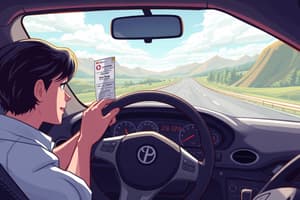Podcast
Questions and Answers
What is the primary purpose of a learner's permit?
What is the primary purpose of a learner's permit?
- To provide insurance coverage for beginner drivers.
- To enable new drivers to practice driving under certain restrictions. (correct)
- To allow new drivers to drive independently without restrictions.
- To replace the need for a full driver’s license.
What is a common eligibility requirement for obtaining a learner's permit?
What is a common eligibility requirement for obtaining a learner's permit?
- Must have a full driver's license.
- Must pass a vision test. (correct)
- Must be at least 18 years old.
- Must have a high school diploma.
Which restriction is typically placed on learner's permit holders?
Which restriction is typically placed on learner's permit holders?
- They can take passengers on board without limitations.
- They may drive without a supervising adult.
- They are allowed to consume a small amount of alcohol.
- They must avoid driving during specific hours. (correct)
What is usually required for minors to obtain a learner's permit?
What is usually required for minors to obtain a learner's permit?
How long is a learner's permit typically valid?
How long is a learner's permit typically valid?
What is a benefit of having a learner's permit?
What is a benefit of having a learner's permit?
What may happen if a learner's permit holder fails to comply with restrictions?
What may happen if a learner's permit holder fails to comply with restrictions?
What is an important consideration regarding learner's permits?
What is an important consideration regarding learner's permits?
What is typically required before transitioning to a full driver's license?
What is typically required before transitioning to a full driver's license?
Which of the following is NOT a benefit of having a learner's permit?
Which of the following is NOT a benefit of having a learner's permit?
Flashcards are hidden until you start studying
Study Notes
Permit Driving Overview
- Definition: A learner's permit allows new drivers to practice driving under certain restrictions before obtaining a full driver's license.
General Requirements
- Eligibility: Typically requires the applicant to be a minimum age (varies by state, often 15 or 16).
- Written Test: Must pass a written or knowledge test on driving laws and road signs.
- Vision Test: A vision screening may be required to ensure safe driving capability.
- Parental Consent: For minors, parental or guardian consent is usually needed.
Restrictions
- Supervised Driving: Must drive with a licensed adult (usually 21 or older) in the passenger seat.
- Time Limits: Some permits restrict driving during certain hours (e.g., night driving).
- Passenger Limits: Limits on the number of passengers allowed in the vehicle.
- No Alcohol: Zero tolerance for alcohol consumption while driving.
Duration
- Validity Period: Permits are typically valid for a certain period (often 6 months to 1 year).
- Renewal: May need to be renewed if the driver does not progress to a full license in time.
Transition to Full License
- Practice Hours: Some jurisdictions require a minimum number of supervised driving hours.
- Driving Test: After fulfilling requirements, a road test must be passed to obtain a full driver’s license.
Benefits of a Permit
- Experience: Allows new drivers to gain experience in a controlled manner.
- Confidence Building: Helps build confidence before driving independently.
- Learning: Provides time to learn road rules and vehicle handling.
Important Considerations
- State Laws: Permit laws and restrictions vary by state; always check local regulations.
- Insurance: May need to be covered under an insurance policy while driving with a permit.
- Compliance: Adherence to all permit restrictions is crucial to avoid penalties or delays in obtaining a full license.
Permit Driving Overview
- Learner's permit allows new drivers to practice driving under restrictions before achieving a full driver's license.
General Requirements
- Eligibility typically requires applicants to be at least 15 or 16 years old, depending on the state.
- A written or knowledge test on driving laws and road signs must be passed to qualify.
- Vision screenings are often required to verify safe driving capabilities.
- Minors usually need parental or guardian consent to obtain a permit.
Restrictions
- Driving must occur with a licensed adult (generally 21 years or older) in the passenger seat.
- Some permits place restrictions on driving during certain hours, particularly at night.
- Limitations may be set on the number of passengers allowed in the vehicle.
- There is a strict zero-tolerance policy for alcohol consumption while driving with a permit.
Duration
- Permits are usually valid for a limited period, often ranging from 6 months to 1 year.
- Renewal of the permit may be necessary if the driver fails to progress to a full license within the validity period.
Transition to Full License
- Certain jurisdictions require a minimum number of supervised driving hours before advancing to a full license.
- A road test must be passed after meeting all prerequisites to obtain a full driver's license.
Benefits of a Permit
- Enables new drivers to gain essential driving experience in a structured environment.
- Builds driving confidence as learners practice before driving alone.
- Provides an opportunity to learn and understand road rules and vehicle handling techniques.
Important Considerations
- Permit laws and restrictions differ by state; it's crucial to review local regulations for compliance.
- Drivers may need to be covered by an insurance policy while operating a vehicle with a permit.
- Adhering to all restrictions is vital to avoid penalties and ensure a smoother transition to a full license.
Studying That Suits You
Use AI to generate personalized quizzes and flashcards to suit your learning preferences.




